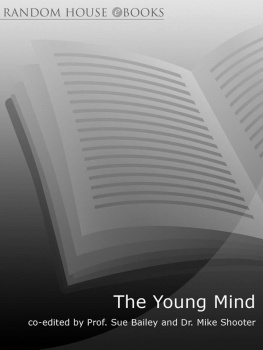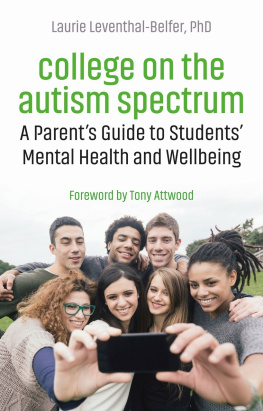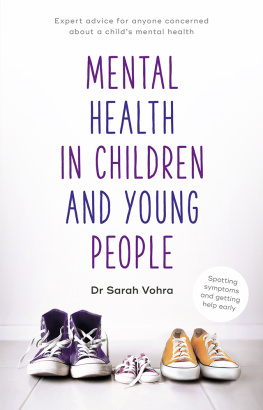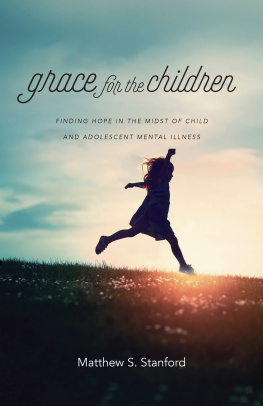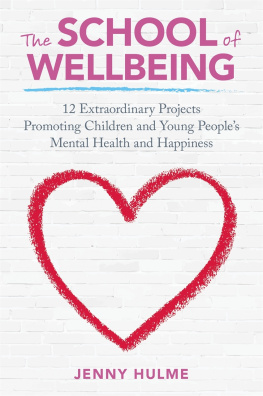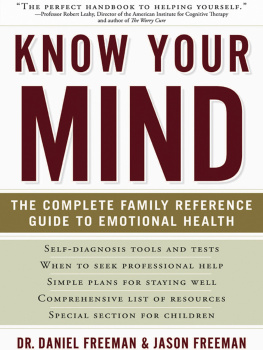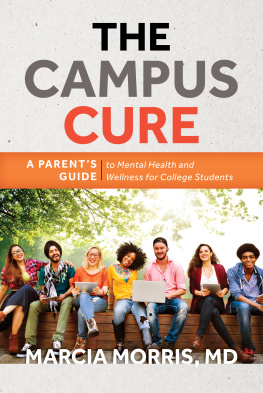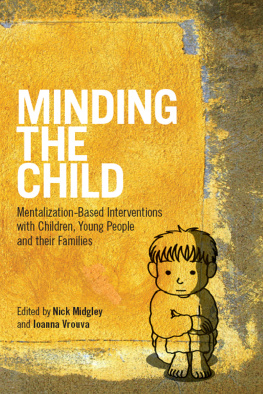THE YOUNG MIND
Co-edited by
Professor Sue Bailey and
Dr Mike Shooter


This eBook is copyright material and must not be copied, reproduced, transferred, distributed, leased, licensed or publicly performed or used in any way except as specifically permitted in writing by the publishers, as allowed under the terms and conditions under which it was purchased or as strictly permitted by applicable copyright law. Any unauthorised distribution or use of this text may be a direct infringement of the authors and publishers rights and those responsible may be liable in law accordingly.
Version 1.0
Epub ISBN 9781409091011
www.randomhouse.co.uk
TRANSWORLD PUBLISHERS 6163 Uxbridge Road, London W5 5SA A Random House Group Company www.rbooks.co.uk
First published in Great Britain in 2009 by Bantam Press an imprint of Transworld Publishers
Copyright The Royal College of Psychiatrists 2009
Illustrations on pp. 5, 17, 53, 125, 233, 245, 277, 329 and 354 Christine Roche Illustration on p. 50 The Royal College of Psychiatrists
The Royal College of Psychiatrists has asserted its right under the Copyright, Designs and Patents Act 1988 to be identified as the author of this work.
In all case histories names of people, places, dates, sequences or the detail of events have been changed solely to protect the privacy of others. The authors have stated to the publishers that the contents of this book are true.
A CIP catalogue record for this book is available from the British Library.
ISBN 9780593061381
This book is sold subject to the condition that it shall not, by way of trade or otherwise, be lent, resold, hired out, or otherwise circulated without the publishers prior consent in any form of binding or cover other than that in which it is published and without a similar condition, including this condition, being imposed on the subsequent purchaser.
Addresses for Random House Group Ltd companies outside the UK can be found at: www.randomhouse.co.uk The Random House Group Ltd Reg. No. 954009
The Random House Group Limited supports The Forest Stewardship Council (FSC), the leading international forest-certification organization. All our titles that are printed on Greenpeace-approved FSC-certified paper carry the FSC logo. Our paper procurement policy can be found at www.rbooks.co.uk/environment
Typeset in 11/15pt Minion by Falcon Oast Graphic Art Ltd. Printed and bound in Great Britain by Clays Ltd, Bungay, Suffolk
2 4 6 8 10 9 7 5 3 1

Contents
We dedicate this book to all children, adolescents and young people growing up in todays challenging and changing times. We hope it will help them and those who support them through their emotional struggles, particularly parents, teachers and all those with a caring role to grow into mentally healthy young adults.
Also published in collaboration with the
Royal College of Psychiatrists
THE MIND, A USERS GUIDE
For more information on the Royal College of Psychiatrists, visit their
website at www.rcpsych.ac.uk
Acknowledgements
T HE R OYAL C OLLEGE OF P SYCHIATRISTS would like to acknowledge the contributions from all the psychiatrists, health professionals and College staff who took part in the production of this book. We would also like to thank the team at Transworld Publishers, who supported our vision in publishing the first book to encompass all aspects of the young mind.
Foreword
G ROWING UP IN TODAY S SOCIETY is tough and competitive. There are times in all childrens lives when they need understanding, support and advice. But all too often adults feel powerless, and may be unsure about what to do and when to do it.
In my experience as a child mental health practitioner, I have found that it is natural for parents to worry that they are not doing the right thing for their children. Children are often very secretive about their social and emotional lives, and sometimes it is hard for parents and teachers to recognize when things are going wrong.
Some children are also born with developmental and behavioural difficulties, such as autism or Aspergers syndrome. In these circumstances, parents often feel that it is their fault and dont know where to turn for help.
There are hundreds of parenting guides and books on different aspects of childrens physical, emotional, psychological and social development. The sheer volume of conflicting information and advice can leave parents feeling confused and less expert in raising their child.
This is the first time that all the complexities and anxieties about bringing up children have been brought together in one essential and reliable guide. It gives practical advice on growing up, parenting and families, school, emotional health and social problems. It also tackles issues that many people both adults and children find difficult to talk about. This includes things going wrong in families because of abuse, neglect or violence; gang culture; sexuality; and what happens to young people who end up in trouble with the police.
This valuable book discusses the emotional difficulties that children and adolescents go through at different stages in their lives, such as depression or anxiety, in a straightforward and open way and each chapter signposts you to further help and support. It will also help people to understand the normal development of children and their families. It is aimed not only at parents, but also teachers and young people themselves.
I feel confident that this family handbook, written by experts in child and adolescent mental health professionals who have spent their working lives dealing with the problems that parents and children face will be essential reading at many different stages in your life.
Professor Tanya Byron
Introduction
N O ONE WOULD BLAME PARENTS for being scared by the figures. Hardly a week seems to pass without reports of the emotional struggles our children, adolescents and young people are going through. Take, for example, the stories plastered all over the media in the first few weeks of 2009.
A survey carried out for the Childrens Society in the UK showed that little has improved since UNICEF declared two years ago that Britain was the least happy place for a child to be raised in the Western world. Researchers at SANE were shocked by the discovery that 1 out of every 9 young people has attempted serious self-harm as a way out of their distress. Families in South Wales were shown to be still reeling from the suicides in and around Bridgend over the previous year. Dietitians swung between worries over how obese our adolescents are becoming and worries about how anorexia is affecting younger and younger age groups. And in one issue of a national newspaper, official figures noted that rates for teenage pregnancies are rising; nearly a quarter of a million children truant from school every week; and the DNA of over 2 million children is now stored on the national database and police computer registers.
In the midst of all that, is it any surprise that many parents untrained for the job, stretched by financial worries, and often isolated from family and friends who might have given them good advice are left wondering if they can ever get it right? Is their young childs unruly behaviour a sign of hyperactivity? Is their teenagers moodiness a symptom of dangerous depression? Is their daughters latest food fad part of an incipient eating disorder? Is her first relationship a prelude to pregnancy? Has their sons skirmish with the law launched him on a criminal career? Will they be marked down as the sort of parents who produced a hooded young thug?

